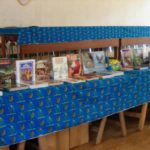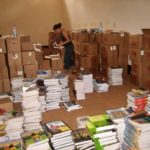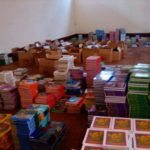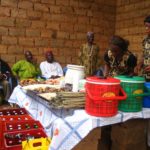Library Project Proposal
Introduction
Peace Corps Volunteer (“the PCV”) in Batié, Cameroon proposes the establishment of a library for the public primary school of Famgoum I. The project aims to increase literacy in both English and French, to improve teaching efficiency within the classrooms, to develop general interest in reading and learning, and to utilize the library as a means to create after-school programming.
Background
Literacy has long been a gateway to knowledge. In the rural schools of Cameroon, access to information and even reading material is very limited. Inside the classroom, students often cannot afford the proper required textbooks, making teaching difficult and learning ineffective. Outside of the classroom, students have virtually no access to supplemental learning or leisure reading material. Gaining access to books is thus a primary goal to increase literacy and stimulate interest in knowledge acquisition.
Proposal
The PCV proposes a comprehensive learning project that centers on the creation of a library within the public primary school of Famgoum I. The project seeks reading materials in all subject areas, appropriate for students between the ages of six and twelve. In addition, the project proposes purchasing textbooks as properties of the school. The school will issue textbooks to students at the beginning of the school year, and retrieve them at the end. This will ensure students have proper textbooks during the school year, resulting in effective teaching and learning. This will also heighten this project’s sustainability, educating students year after year.
The PCV will use the library as an avenue to begin after-school programs in the areas of reading, writing and mathematics. In addition, the PCV will train teachers within the school to administer the programming to ensure sustainability.
Benefits
The textbook portion of the project will ensure the 263 students of Famgoum I have complete access to required textbooks for each class, therefore significantly increasing learning and teaching efficiency. The after-school programs will stimulate interest in the areas of reading, writing and mathematics for approximately 50 to 75 students during each term. The collection of reading materials within the library will provide all students an opportunity to access more information and increase literacy skills. Currently, the school has a pre-designated space for a small library and a strong interest from the faculty and student body to support the project. The sustainable nature of this project will continue to benefit all future students of Famgoum I primary school beyond the current pupils.
Procedure
Phase I
Project will begin with a dialogue between the PCV and the faculties of the school to reach a complete understanding on the concept of the library, textbooks as school property, and facilitation of after-school programs. The PCV will seek funding and book donation for the project through foundations, non-governmental organizations and other philanthropic institutions.
Phase II
The PCV will train designated faculty on basic library management and begin organizing book donations. The concept of library and the after-school programs will be explained to all students and those interested in the after-school programs will be selected. As materials arrive, the library club and mathematics club will begin once a week after school hours. Continual solicitation of book donations will take place during this phase to expand the library. Finally, the PCV will obtain funding to purchase a complete set of textbooks for the next school year (2009-2010).
Phase III
The PCV takes an observatory role in the after-school programs and oversees library management. Library book collection will continue to expand and if necessary, the library will seek a larger space to better accommodate the operation.
Results
The project will result in a fully functioning library, which raises awareness and improves upon literacy, and the after-school programming will supplement in-class learning for the students of the school. In addition, the students will have complete sets of textbooks that belong to the school and families will not bear the burden of purchasing books each school year.
Schedule
Cost and Fees
Total: 263 students; 2,175 books; $10,875
Total Costs
For further information, please contact PCV Wendy Lee at [email protected]. All reading materials can be sent to:
Furthermore, I have an idea to begin a small community library in the center of town. The mayor recently built a nice building for community functions but it remains largely empty and unused. Access to information here is very limited since newspaper or any sort of reading material do not exist and only some have the luxury of television and radio. My idea is to begin building a collection of reading material in current events, agriculture, businesses, etc. These material would need to be in French. Currently, I am researching NGOs around the world who will donate these resources.
Last week when I asked my students to open their English books, madness occurred. People were hurdling into groups. I thought, maybe they aren’t used to brining books to class, so I reminded them to bring them this week. Two days ago, I again asked students to open their book. This time though, I asked them to raise their hands if they even have books. As I had found out, someone in the family is responsible to buy these books and many simply don’t have them. In one of my classes, only 4 people out of a class of nearly 40 had books. I gave up, and started copying the paragraph I wanted them to read on the blackboard. As you can imagine, the efficiency greatly diminishes when I have to spend precious teaching time writing things on the board, and wait for them to copy. I am 90% sure the students have no idea what they are writing; they are just accustom to copying whatever the teachers write on the board.
My point is, they need textbooks. If I can get the school to buy the books so that it becomes school property, then the students in the year following will still be able to have books. Let’s face it, this is not the US, schools don’t change editions every year…






I think this is a noble idea, but perhaps a bit overly ambitious. As an RPCV who served in Cameroon, I think it’s important to bear cultural competency in mind. How prepared is the school and the community for community property? What happens if a student doesn’t have his or her book to return at the end of the year?
And, I don’t know about today, but 15 years ago, Peace Corps actively discourgaged “monument building” like libraries. I don’t mean to discourage an idealistic 20-something, but encourage you to give the village a bit more time before pouring the financial investment you’re talking about here into it.
Finally, there is a way that some Education PCVs made mimeographs so that they could copy pages out for their students. It involved carbon paper and gelatin – maybe that would help you.
There are several things I think you should think about: 1) what percentage of the project will be a community contribution and is the community willing to meet that expectation? 2) is this project proposal being submitted via Peace Corps Partnerships? 3) how will you measure the outcomes? (RPCV, Mali)
Hey Wendy,
If you’ve read my blog at all, you know that I am all about reading and education as the most efficient ways to help Cameroon develop. The problem is how to do that – get books into their hands and make the education system better. Their are two potential issues I see with your proposal.
One is the cost. Coming up with that much money is going to be difficult. And even if you find it, it probably means that the community wouldn’t have been able to do something like this or another project of similar scope without a lot of help. This kind of perpetuates the mentality of dependance which I believe is just as much a part of the problem.
Second is that there is a lot of ‘PCV’ in the project. It seems like most of the work would start and end with you. That could make it very likely that the enire project would end when you leave. Is there someone in the community that is as excited and motivated about this issue as you are? If so get them involved. Let them take the driver’s seat.
I think we agree 100% on the problem. The question is how to solve it. Sorry I don’t have an easy answer for you. It wasn’t until a couple of months ago (over a year into my service) that I finally started feeling good about the work that I’m doing. And what I’m doing is on a pretty small scale. It wasn’t until I accepted how useless I am to solve these problems that I think I finally started to be able to help. What am I saying? I’m not sure exactly, but keep thinking about it and don’t get discouraged. Let me know how it goes.
Tim
timhartmancameroon.blogspot.com
You should consider going through the PC Partnership Progam. They collect a lot on in-kind donations of books and other library-related stuff.